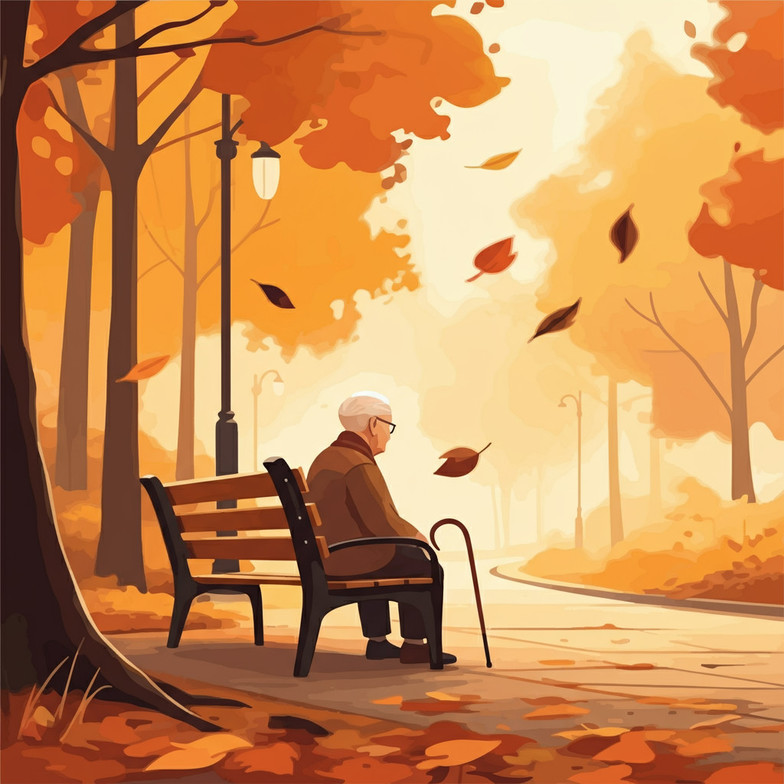
While there’s growing awareness about youth mental health, the reality is that older adults—especially those facing grief, illness, or social isolation—are at greater risk of suicide. In Ontario and across Canada, older adults die by suicide at a much higher rate than younger people, yet their struggles often go unnoticed.
As a grief-focused therapist working with clients in Toronto and across Ontario, I regularly speak with individuals navigating loss, aging, and disconnection. If you’re caring for an older adult or grieving someone who has died by suicide, this post outlines what we know about risk factors, signs to look for, and how psychotherapy can support healing.
Suicide Risk in Older Adults: The Numbers
The numbers are stark. In Ontario, 33% of suicide attempts in older adults result in death—compared to just 0.005% among youth (Novilla-Surette et al., 2022). That’s not just because older adults use more lethal methods. It also speaks to how serious things have become by the time they reach that point. Often, signs were missed—or help was never offered.
Why Are Older Adults More Vulnerable?
There’s no single cause. But common factors include:
Cumulative Loss
Aging is often accompanied by the death of partners, friends, siblings, and sometimes even adult children. These losses, especially when they stack up, can create a sense that life is closing in.
Isolation
Mobility issues, living alone, or moving to a care facility can cut older adults off from meaningful connection. Even in cities like Toronto, older adults can feel invisible.
Chronic Illness and Pain
Living with multiple health conditions takes a toll. Pain, fatigue, or cognitive decline can erode quality of life and create a sense of futility.
Feeling Like a Burden
Many older adults worry about “being a problem” for their families. When they say things like “I don’t want to be a burden,” it’s often more than modesty. It can be a signal of deeper distress.
Cultural and Gender Factors
Men over 85 are at the highest risk of suicide, particularly those who don’t talk openly about mental health. Cultural norms around privacy, stoicism, and self-reliance—especially in some immigrant communities—can also reduce help-seeking.
Warning Signs We Might Miss
It’s easy to chalk certain behaviours up to “just getting older.” But changes in mood, social engagement, or daily habits can indicate more serious mental health concerns.
What to Watch For:
-
Withdrawal from family or community
-
Giving away possessions or saying goodbye
-
Changes in appetite, sleep, or personal hygiene
-
Expressing hopelessness (“What’s the point?” or “I’m just in the way”)
-
Talking about death, dying, or looking into methods
These aren’t just personality quirks or “normal” aging. They’re signs someone might be struggling—and possibly thinking about suicide.
Why It’s Hard to Talk About
Older generations didn’t grow up in a time when mental health was openly discussed. Many were taught to keep emotions to themselves, or to “stay strong” and carry on. This can make it harder for them to ask for help—or even to name what they’re feeling.
That’s why families, caregivers, and health providers need to take the lead. Ask the hard questions. Create space for real conversations. Don’t wait for someone to say they’re in pain.
Supporting an Older Adult Through Grief and Risk
Here are a few protective steps that can reduce risk and increase connection:
1. Check In—Regularly
Frequent phone calls, walks, or video chats matter. You don’t have to fix anything. Just being present can make a difference.
2. Make Therapy Accessible
Grief therapy can help older adults process loss, reflect on meaning, and feel less alone. It doesn’t have to be talk-heavy or endless—it can be short-term and focused.
3. Remove Lethal Means
Secure medications and limit access to harmful tools. This isn’t about control; it’s about prevention.
4. Help Them Reconnect With Purpose
Whether it’s gardening, storytelling, volunteering, or art—activities that offer structure and meaning can reduce despair.
Grieving a Suicide: What Helps
If someone you love has died by suicide, the grief can feel especially complex. You may be left with unanswered questions, guilt, or a deep sense of shock. Therapy can help make space for these feelings—without judgment or pressure to “move on.”
In my work with grieving clients across Toronto and Ontario, we focus on making sense of the loss, identifying supports, and finding ways to carry forward the relationship in meaningful, honest ways. Healing doesn’t mean forgetting. It means learning to live alongside what’s happened.
If You're Concerned
If you’re worried about an older adult in your life—or navigating grief after a suicide—don’t wait to reach out. Therapy can provide structure, perspective, and support through difficult terrain. You don’t have to figure it out alone.
If there’s an immediate concern for safety, call 911 or contact a local crisis line. In Toronto, you can call Talk Suicide Canada at 1-833-456-4566.
References
Christensen, M. et al. (2023). Suicide ideation in older people: A qualitative review and meta-aggregation of Asian studies. Frontiers in Psychiatry, 14, 1169820. https://doi.org/10.3389/fpsyt.2023.1169820
Mental Health Commission of Canada. (2022). Fact Sheet – Older Adults and Suicide. https://mentalhealthcommission.ca/wp-content/uploads/2022/06/Older-adults-and-suicide-fact-sheet.pdf
Novilla-Surette, E. M. P., Shariff, S. Z., Le, B., & Booth, R. G. (2022). Trends and Factors Associated with Suicide Deaths in Older Adults in Ontario, Canada. Canadian Geriatrics Journal, 25(2), 134–161. https://doi.org/10.5770/cgj.25.541
Monica Lau
Contact Me



